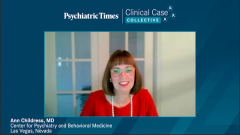
Adolescent Patient with ADHD: Patient Case 2
Panelists discuss how a 17-year-old patient’s challenges with inattention, anxiety, and executive dysfunction ahead of college highlight the importance of balancing pharmacologic and nonpharmacologic attention-deficity/hyperactivity disorder (ADHD) treatments. They address concerns about stimulant use and medication diversion.
Episodes in this series

Adolescent ADHD treatment requires specialized consideration of developmental factors and increasing cognitive demands, particularly as students transition from high school to college environments. The case presentation of a 17-year-old patient illustrates typical challenges faced by predominantly inattentive patients with ADHD whose symptoms become more prominent under increased academic and social pressures. Executive functioning deficits often become apparent during critical transitions, despite previous compensatory mechanisms that masked underlying difficulties. Health care providers must assess functional impairment comprehensively, even when diagnostic criteria may not be fully met due to developed coping strategies.
Treatment planning for adolescent ADHD emphasizes pharmacologic intervention while maintaining behavioral supports and environmental modifications. Amphetamine-based formulations often prove more effective than methylphenidate options in this age group, requiring careful dose optimization at 0.25 to 0.5 mg/kg for therapeutic benefit. Family involvement remains crucial despite increasing patient autonomy, particularly regarding medication safety and storage. Executive function training and organizational skill development continue to play important roles, though medication typically provides the foundation for other interventions to succeed effectively.
College-bound patients with ADHD face unique medication diversion risks and safety concerns that require proactive management strategies. Health care providers must balance treatment benefits against misuse potential, implementing medication security protocols including safes and limited daily supplies. Patient education about diversion consequences and peer pressure situations is essential for maintaining treatment integrity. The college environment presents both opportunities and challenges for ADHD management, necessitating comprehensive transition planning that addresses academic accommodations, medication management, and social pressures while fostering independent self-advocacy skills.
Newsletter
Receive trusted psychiatric news, expert analysis, and clinical insights — subscribe today to support your practice and your patients.









